#she's a character in a narrative and we can analyze her without the need to moralize her
Text
I need to talk about Morgan Elsbeth and the connection to Thrawn. Along with some other questionable narrative choices Filoni has made with Thrawn.
I want to preface, this is not going to be a hating Morgan Elsbeth post nor hating on the actress or any bts production of her character. There is enough hate towards characters like this in this fandom and I will not be perpetuating that (take that negativity somewhere else). I only want this to be an open discussion on this part of Thrawn's story.
Morgan is a character that has been placed into Thrawn's canon timeline. She was not written in (everything is written obvs but let me explain). The distinction I want to make between those narrative ideas is, placing a character into a story means they are important in supporting the main character, but no one cares if they are replaced or removed from the story. Writing a character into the story means they are so important to the direct development of the mc, if they are replaced or removed it feels like a piece of that character is missing. Some examples for Thrawn would be Eli Vanto or Ar'alani. Morgan was removed from the story in the Ahsoka series and it didn't even effect Thrawn himself.
So why create this character and push a narrative that makes her seem like the most important part of the story? Like without her Thrawn wouldn't be able to get back to the galaxy? Thrawn is a genius, a warrior, and a survivor. He could've figure that out himself, or with the help of Ezra (an established character that the audience loves). Instead he's had to rely on Morgan.
This is where my qualm with Dave Filoni comes into play. I love Filoni's work he has created some of my favorite stories in the Star Wars franchise. But he does one thing that I despise. Ignores the work of amazing authors. In this case Timothy Zahn. I can't say for sure that he hasn't read the Ascendancy Trilogy or the Thrawn (2017) trilogy, but it feels like it when analyzing Filoni's characterization of Thrawn. If he did read those books or least consulted Zahn on them he would know Thrawn's true motives for what he does. He is a protector for the greater good. He goes against many higher powers to make the right choice, not the good or bad choices. He shows the characters around him time and time again that he will always do what is right even if it means his downfall. He is not a villain in his own story just himself, not good or bad, the one in the middle. He evolves, learns, observes, and understands things on a completely different level. And we only see a sliver of this characterization in Filoni's story. I understand the narrative built around Thrawn being the ultimate villain for the ghost crew because a good story like this should have an interesting dynamic between protagonist and antagonist. But the fact that you'd have to read his books to know who he is, is a clear indication to me that his novel characterization wasn't researched enough.
It also shows me that Filoni favors the legends version of Thrawn more. Especially with the inclusion of Pellaeon in Tales of the Empire and not Eli Vanto. Who could have easily been placed into that role. Although, he his Thrawn's aide he can and has done things like that for Thrawn.
Now in Tales of the Empire we see that he isn't the original creator of the TIE Defender. Trying to place Morgan into a characters story that is so beloved [Thrawn] feels so forced through this idea that she created the TIE Defender. Why would someone who is trying to get revenge for her people go to the Empire with an idea like this. If she is so angry why she is relying on someone else's power to get her revenge? And even when she got in the good graces of the Empire with Thrawn what came of it? The Defender project was ruined, shouldn't her allegiance to Thrawn be in ruin too. The deal they made implied she would get what she wanted, but she never did and was still loyal to him. Thrawn does have this quality about him though, you'd follow him off a cliff, the gravity in which he attracts people to his cause is so alluring. But that still doesn't explain where Morgans revenge story went. And in the end she really does feel like a character that can be replaced.
Trying to make a character that was placed into the story important to the audience does a disservice to the story as a whole. Thrawn has an established world of characters in the novels that are readily available to use in the narrative. So why aren't they in it? Eli especially in one I cannot ignore the absence of. From the moment Thrawn is found in exile Eli does not leave his side. Eli follows him into battle again and again. Even after realzing his initial career choice will amount to nothing now that Thrawn has taken over his duty in the Imperial Navy. Thrawn himself says "you hold my words in your hand, and their meanings," and although that was in relation to his survival with the Empire it still held true throughout the story. Eli is an extension of Thrawn, whatever is said to Eli is said to Thrawn and vise versa. So where is he?
(Ok that's all my ramblings for now. Hopefully this made sense. Feel free to leave your thoughts in the tags or replies. Thrawn was the first sw novel I read, I'm fiercely protective of him. So when his characterization is kinda ruined like this it upsets me. But I'm always excited to see him in any media and hear that silky voice of his, thank you lars.)
#thrawn#thrawn 2017#eli vanto#star wars#sw novels#morgan elsbeth#ahsoka series#tales of the empire#tote spoilers#sw spoilers#long post#nobie does stuff
76 notes
·
View notes
Text
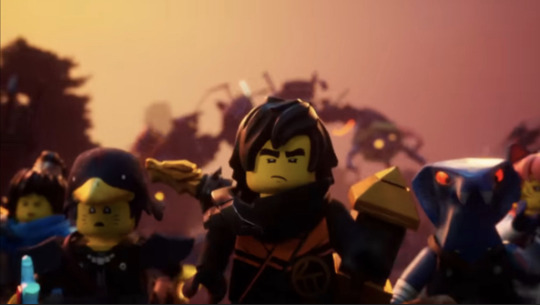
Not to be the over analyzing Cole fan… but am I the only one both surprised and delighted by this shot?
Cole is in the front and center, running, and he looks SO cool! I am rotting for him and everything he does!
Now, I need to admit this is weird. Cole is rarely put in front and center for shots, he is usually in the back, SPECIALLY in running shots, that’s why I have the head cannon that due to his weight/muscle he is not that fast (When compared to the other Ninja) And the show seems to follow this. To be honest I am having a hard time thinking of a running shot when he is front and center that doesn’t belong to Master of The Mountain. Because in there it doesn't matter whether or not he is the fastest, he was the focus character, therefore the focus of the shot goes to him.
And THAT'S what has me so intrigued. Master of the Mountain was Cole’s focus season, his moment to shine, it made sense when he was leading the Upply for him to be front and center... But Now? I am surprised it isn't Nya.
Okey, ignore for a second, the fact that Cole was one of the main 4, ignore the fact that he was the original leader of the team. Dragons risings is a soft reboot. Meaning that while all the other seasons are still relevant, A soft reboot is written in a way someone that has not watched the previous seasons can still jump in and follow along. That's why we have Arin and Sora, new characters that allow the writers to re-explain old concepts without it looking like the characters we grew up with are being idiots.
With this in mind I have to ask... Why is Cole front and center? (And I repeat, he is my absolutely favorite character here) but from the soft reboot perspective... isn't Cole a new character? isn't Cole someone new to the team and therefore new to the plot and narrative? In relationship to the plot and narrative of the soft reboot, Sora is the character we have spent more time with, yet it doesn't make sense for her to be front and center. Sora has not expressed desire to be the leader, and doesn't have the push to lead a team (at least not rn, when we only have her development up to half s1, and the trailer for part 2). Nya on the other hand, she is a character that through Sora's eyes -our POV character in essence- has some sort of authority, we have been with her for longer too. Nya is someone Sora can look up to, learn from, and follow... So it would make sense to have Nya in the front and center... Yet she is not even next Cole.
Notice how not only are both Sora and Nya parallels at the back, not front, they are also blurry... In fact, Cole is the ONLY character in this shot who is not blurry. In addition to being front and center, the animators blur the other characters as Cole runs closer to the camera. Hell, even in the composition, you could draw a clear triangle with the other characters, and Cole is a the peak. He is the focal point, and this ensures the viewer is looking at Cole, but more importantly HIS expression.
His is the only expression that is 1) clear to see, and 2) not showing fear. He is angry, focused... determined.
This bring the actual question of the post... Why use these visual framing devices this way if not to give Narrative focus to Cole?
Could this episode focus on Cole? could we maybe see how he found the formling and the serpentine? notice too how they are next to Cole, and in front of Nya and Sora -aka closer to Cole (Maybe both figurative and literally)-... Could this episode touch on his new team, perhaps show him leading? Because I can't think of another narrative reason as to why they would put so much visual focus of a running scene on Cole.
And you could say "Duh, the episode is of when they find Cole, of curse they are going to focus on him" and You'll be correct, but also you are not getting my point. What I am saying is that, if this level of focus is anything to go by, Cole fans are going to eat, this episode is going to be a meal. Cole is about to kick some mech's ass so bad that bitch is going to go back to the mechanic crying and we as viewers are going to have front row seats to the whole thing.
Cole might be having a focus episode where his leadership skills are shown, where he is being fatherly, where he is showing himself as the responsible rock of the team. THIS is not any focus episode, this is a five start restaurant meal. A buffet.
Anyways... I am trying to keep my hopes low, but I needed to put this out there real quick.
#thanks for reading my decent into insanity#this is what I use my Visual storytelling degree for mom#anyways#Cole did so adopt those kids huh#the rocky family#ninjago#dragons rising#sora ninjago#Nya ninjago#nya smith#nya jiang#cole brookstone#cole ninjago#dragons rising spoilers#ninjago analysis#meta#analysis#wait does this qualify as meta? i trully dont know so lemme know#ninjago meta
175 notes
·
View notes
Text
Frye is the new Marina: Exploring Frye and Minority Anxiety (An essay by @Terminatorbuns)
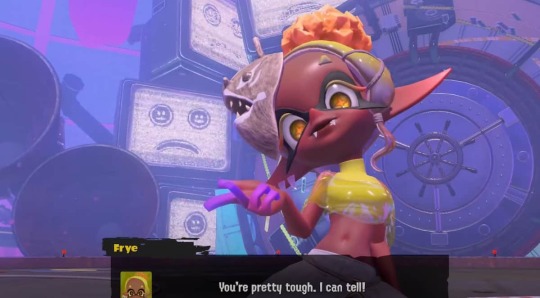
I'm gonna preface this with something very important: Frye is best girl. Fight me, I write lore essays. I wrote that other essay on Deep Cut and I've continued to obsess over them since, especially on Frye, who's been an extremely interesting character for me to analyze.
We know Frye, she's the chipper Inkling idol partner to the more sophisticated Octoling Shiver. There's obvious parallels to be made with the previous idol group, Off the Hook, since Frye is like the energetic Pearl and Shiver is like the cool Marina. And uhh .. that's probably all there is to it, essay's over, everyone go home.
No but seriously, what I want to share instead today is the personal, alternative interpretation I arrived at after obsessively overthinking the situation since release. It's not fully supported by canon, but this is a reading of Frye constructed from the most subtle lore details a Frye-obsessed lore nerd could find, and I hope to at least highlight some lore elements the community might have missed. I want to demonstrate the layers upon layers of complexity that can be read into Frye as a character, and why I care so fucking much.
Frye isn't the new Pearl, she was the new MARINA this whole time and it took me months to see it. Yes, it has absolutely everything to do with their skin color. Splatoon's world is designed with real life racial diversity in mind and, intentionally or not, are also influenced by real life racial dynamics in turn. Like Marina, the analysis of Frye absolutely OPENS UP if we examine her through the lens of her real life racial status, we start to infer stuff about her motivations, her fears, her secret needs and wants, EVERYTHING is on the table. Good news for Shiver fans, I can't talk about Frye without digging into her relationship with Shiver (platonic or otherwise) so that's going to happen too. We need to talk about our precious brown baby.
1. Frye the Minority
To state the obvious, Frye's ethnicity is South Asian, probably India. The Splatoon world doesn't really have a Squid India in it but it's clear what her real life inspirations are. She's very brown, she wears Aladdin pants and mango chutney on her head. She's got a snake charmer flute thing going on and all her musical motifs are played with South Asian instruments. It's a bit on the nose.
Thing is, Splatsville is a Japanese city in design. Splatsville is called Bankara city in Japanese, it's named after a literal Japanese fashion movement and the visual design elements of Splatsville are reminiscent of a rural Japanese city. Splatsville takes little visual inspiration from South Asia, and that makes sense since Splatoon is made by Japanese devs who would be most familiar with Japan.
The consequence of this is that Frye stands out as a uniquely brown-coded person in a world where nobody else looks like her. Not even playable inklings with dark skin look like her, what with her teeth and her pointy mask and her big forehead. It's worth noting that the Octoling narrative in Splatoon 2 takes inspiration from the experience of Black Americans, and the dark skinned Octolings of Inkopolis are mostly coded black, not South Asian. Even if the racial identities of squids don't necessarily match real world racial identities, Frye is recognizably a minority both visually and culturally in-universe. This is reminiscent of Marina, who was one of the only visible Octolings in Inkopolis until playable Octolings were formally implemented.
It's worth noting now that Shiver, in contrast, fits in perfectly: she's a traditionally attractive Japanese girl (we're talking about fem Shiver right now, bear with me) in a Japanese city. Even though Octolings should be an in-universe minority, and even though she too has somewhat unconventional features, the idea that she's a minority just doesn't track visually. We'll circle back to this and discuss why it doesn't really work for her character narratively either.
2. Frye the Villain
I've covered this in my previous essay but Frye is a stage villain by trade, and her style of performance is inspired by Kabuki. The Japanese inspiration makes sense, even though she's an ethnic minority her sunken scrolls suggests that her family is well established in the region, meaning they immigrated a long time ago and Frye's grown up in Splatsville. Frye is a Japanese national with roots in South Asian culture, it's understandable that she has adopted mannerisms of both cultures.
But like, why a villain? And what's the deal with Marina also representing Team Villain in the heroes vs villains Splatfest? I was wondering if there was a connection there until it hit me, Frye's TOO BROWN to apply for hero roles. In real life, the Japanese entertainment industry famously has problems with colorism and racial representation. Even darker skinned Japanese people have trouble landing gigs as leading heroes because the industry favors light skin, and Frye is both very brown and not conventionally attractive by Japanese standards. Film industries in the West have very similar problems with colorism so it's a recognizable problem to western audiences, also. Frye's career choice as a professional villain is informed by the fact that people like her literally cannot land jobs as heroes.
That's not to say Frye resents her role, Frye loves being a villain. Her poses are dynamic, her speeches are charismatic, she's at her happiest when she is playing an antagonist. If you look at her blasting off with her smoke bomb, she has the happiest smile on in direct contrast to Shiver who's comically losing her shit. Thing is, Frye identifies with the underdog villains who never win, because Frye herself struggles in an industry that does not favor her. This also explains her sympathies for the underprivileged, and why she's made it a personal mission to raise money for the poor. Looking back at Splatoon 2, Marina was sympathetic to villains for the same reasons, as an Octoling (and as a black person) that was villainized by the society she lives in.
Frye brings her cultural identity into her performance, where she incorporates traditional South Asian dance and snake/eel charming into her fighting style. She takes her heritage seriously too: where Frye comes off as a clown elsewhere, she's deadly serious when using her culturally inspired techniques in a fight. The fact that she has named choreography for each phase of her fight is proof enough of that. Deep Cut's boss fight theme also opens with South Asian instruments and they are the most prominent thematic element throughout, highlighting the fact that villainy is Frye's domain of expertise, not Shiver's. Frye sees both villainy and her cultural background as core parts of her identity and expresses herself with a combination of both.
3. Frye the loner
Thinking back to Splatoon 2, Marina and Pearl had a very clear extrovert vs Introvert dynamic: Pearl likes networking and building musical connections, and Marina is shy and prefers to hole up in a comfy chair and write music all day. We do in fact see this again in Deep Cut, except Shiver is the extrovert who flourishes in front of an audience or a camera. She's eager to play tableturf with agent 3 because she just likes social interaction and competition. The Anarchy Splatcast version of the Deep Cut theme instead features Japanese instruments, signaling that newscasting in front of a camera is Shiver's area of expertise. Shiver's design and mannerisms also visually invoke that of a Geisha, who are professional entertainers trained in hospitality.
You see where I'm going with this, I hope. In a wild fucking twist, the cheerful energetic Frye is secretly an INTROVERT. Frye's area of expertise is the desert wastelands, she's at her most comfortable when there's almost nobody around. She's happy to be on camera with her friends but she also squirms in her seat, being not completely comfortable. Her go-to stress reliever is fighting salmonids who do not speak, and Shiver tells us that Frye runs away from the group during a Salmon Run shift to fight the bosses. Also, Frye's villain specialty isn't well suited to making friends when she kinda attacks strangers on sight.
Frye's tableturf habits are most revealing because she does not make eye contact with Agent 3 sitting across a table from 3. Frye's zoned out thinking about Big Man and Shiver, her closest friends and the people she's most comfortable around. In the news room Frye's attention is also focused on her friends and rarely makes eye contact with the camera. Without her friends nearby, Frye can actually get a bit lost in a social setting.
This reminds us of Marina who's also shy around people, except Marina's anxieties come from being a literal enemy of the state. Marina actually has quite a few contacts in the Octoling community despite being nervous around Inklings for good reasons. Frye has habits that ACTIVELY avoid people, and currently we're not sure she has ANY friends outside of Deep Cut. There's likely a racial aspect to this, of course, the same cultural biases that prevent Frye from playing hero roles are also likely affecting her ability to connect with new people, and it's not a big stretch to guess how it affects her personal habits. Frye doesn't have Shiver's conventionally good looks, she makes a poor first impression as a pointy big headed brown girl in a Japanese-coded world. This might feel a bit familiar as we've seen a similar process play out in real life since Shiver was a lot more well received at launch and Frye took more time to grow on the fandom.
4. Marina and minority excellence
So we've established some similarities between Frye and Marina in that they are likely both introverts affected by racial anxieties, but it's also worth discussing the ways in which they differ. I feel that Frye and Marina take two different approaches to address their racial anxieties, and this accounts for their very different personalities as characters.
Marina represents a picture perfect image of black excellence on an Octopus. She's a prodigy composer that knows every fucking black music style and a genius engineer and she can even draw manga; girl works three jobs. Marina's approach to her minority status is to work hard to be an exceptional representative of her people in the hopes that it will help them be accepted in Inkling society. She's determined to be presentable to the degree that she will hide some parts of her past (although those parts involved a lot of weapons engineering so maybe it's for the best that she's not proud of that). Also, and this is a very lukewarm take, Marina is hot.
Frye has to take a different approach out of necessity, because Frye is not a genius. As talented as she is, Frye is a more average person with anxieties and flaws that she can't hide, and she doesn't have the talent to excel in multiple fields of expertise or the patience to learn how to present herself in polite society. Rather, Frye channels her flaws into her art: her violent tendencies and her social anxieties both inform her villain performance, giving her a distinct edge and charisma that suits her chosen art form. In Japanese, Frye also speaks with distinct country bumpkin mannerisms which are also associated with low societal status. Thing is, Frye embodies Splatoon 3's theme of Chaos as a non-conformist: she can't succeed by conforming to polite societal standards, so she chooses to promote her own, rough around the edges style as a viable art form.
I'm fascinated with this particular interpretation of Frye, whether or not it was intentional by the original designers at Nintendo, because of how much depth it gives Frye's personality. Not only that, but this version of Frye also creates some interesting implications for her contrasting partner, Shiver.
5. Making sense of Shiver
Shiver's role in Splatoon 3 is rather mysterious when you think about it. Our previous understanding was that Octolings was an oppressed racial underclass that come from the military dictatorship in Octo Canyon and have only been integrated into Inkling society for 2-4 years. And yet, Shiver's family history goes back pretty far with very specific artistic traditions that they've preserved, and she has distinctly different visual features than the Octolings of Octo Canyon. I should also point out that the systematic oppression of Octolings draws heavy parallels to the experiences of Black people in America and Japan, and Shiver is… very not black.
Shiver doesn't really work as an Octoling from Octo Canyon, but she also doesn't have to. The Splatlands is a new region with new history and racial politics, Shiver starts making more sense if we assume that she's been in Splatsville this whole time, and her family simply wasn't living under DJ Octavio's rule. If Shiver's history isn't tied to the Octo Canyon narrative, then we have some very interesting angles to explore through the lens of her IRL racial identity as a Japanese girl and how that effects her design and personality. If we follow this line of logic to its conclusion, we'll start to understand how Shiver is actually the new Pearl.
Shiver as a character design is defined by privilege, or at least, the ILLUSION of privilege (more on this later). She's conventionally attractive by Japanese standards in a Japanese setting, so she has the natural advantages of being a member of the racial majority where Frye does not. Shiver's Japanese dialogue speaks in a very formal theatrical tongue which is… fucking weird admittedly but also a clear allusion to high social status, in the same way people use Shakespearen English to sound fancy as shit. Shiver has the looks and mannerisms of a highly presentable racial default Japanese entertainer and she takes advantage of that to achieve her personal goals.
Shiver's goal is to be on TV. Shiver is Deep Cut's newsroom specialist, she wants to be on camera and to be seen by everyone, she's a little obsessive about attention really. Shiver knows her looks are naturally appealing and wants to be in a format where people can see her face, and she uses stage makeup to accentuate her strengths. This is in direct contrast to Frye who prefers stage performance for smaller, curated audience's, and even then Frye uses a mask to hide her face in battle.
This is where Shiver's relationship with Frye starts to resemble Pearl and Marina. Shiver is perfectly aware of her natural advantages as a fair skinned person and has extended that privilege to include her dark skinned partner. This is similar to the same that light skinned Pearl makes it a mission to promote Marina as a minority artist (Pearl's privilege in this case being mountains of money rather than attractiveness). Even though TV is not Frye's specialty, Shiver insists that Frye (and Big Man) be included because Shiver thinks they deserve a spotlight.
That being said, Shiver's style of partnership differs greatly from Pearl. Pearl has a partner with confidence problems, so Pearl takes a very hands on approach to push Marina to seek out new artistic styles and opportunities because Marina is directionless without guidance. Pearl has high expectations for Marina because Marina is a prodigy who will rise to meet those expectations, and Marina appreciates Pearl's involvement greatly. Marina in turn helps Pearl with her destructive vocals, they fill in each other's weaknesses while working towards a similar goal.
In contrast Shiver takes a hands off approach to Frye. Both Shiver and Frye are confident entertainers in different fields of expertise and do not need external motivation, so they do not need to push each other in the same way Pearl and Marina do. What they instead do for each other is provide safe spaces to participate in each other's art forms without judgment: Frye comes to the TV studio despite being awkward on camera, and Shiver gets to play a villain despite being clumsy and manic on stage. Big Man gets to show up to both despite having little ability in either field.
6. Shiver x Frye
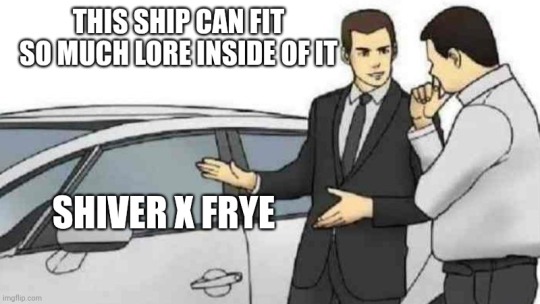
I'm not saying Shiver and Frye have to be a romantic couple, they form an excellent platonic duo dynamic that is just as narratively valuable to the world of Splatoon. I would never be so crass as to suggest that Shiver and Frye should kiss passionately on the mouth. But like, with the information we now have we can dive a little deeper and make some educated guesses on the inner workings of this particular pairing.
Shiver and Frye directly influence each other's personalities, each member of the duo changes when the other is around. Frye becomes softer around Shiver: Frye on her own is tough from a life informed by adversity, she's focused and takes losses with dignity. However, Shiver is using her personal privileges as a light skinned, presentable Japanese girl as a shield for Frye's racial disadvantages to get Frye TV opportunities that Frye would not have had access to alone, and I think Frye appreciates the protection. Frye feels safe enough around Shiver to let her guard down, she feels less pressure to be strong and competent and has an opportunity to be goofier and more vulnerable. This is the Frye we see most often on screen.
Shiver becomes edgier around Frye: Shiver gets to play a villain when treasure hunting with Frye, And we discover that her villain performance is BUCK WILD. This is the second layer of Shiver's personality that I've only alluded to so far, but it's very important to discuss what Shiver gets out of her relationship with Frye.
Shiver's character is about presentation; she has gone to great lengths to learn the behaviors of a traditionally feminine, high class entertainer. She's polite to a fault and extremely particular about her movements both on TV and on a dance stage. There's no reason to believe this is a facade, Shiver has put so much energy into her act that it's more likely that this is Shiver's idealized self, the image she actually wants to present to the world.
What is simultaneously true is that Shiver DOESN'T perfectly conform to her own idealized self image. There's a messier side to Shiver's personality that she tries very hard to hide: she's competitive, petty, and vindictive under specific circumstances, all traditionally unfeminine traits. She's not doing a great job at hiding them either, these traits are part of her personality and slip out despite her best efforts. It's important to consider that Shiver likely also grew up in Splatsville, making her a country girl too with the same rough rural upbringing as Frye. This just makes her attempt to present as high-class even funnier.
My personal interpretation of the dynamic of Frye's relationship to Shiver is that Frye accepts all of Shiver's messier personality traits, enjoys them, even. Frye is a deliquent that stands for conflict and non-conformity to begin with, so Frye offers a safe space where Shiver can both embrace her messier side and be celebrated for it. Shiver can take nasty verbal jabs at Frye and Frye will fire back cheerfully. This is why Shiver is so wild as a villain, the repressed parts of her personality comes out in full display when she's in a space with only Frye and Big Man, and Frye in particular seems to know all of Shiver's secrets to a level that Big Man does not. This way, Shiver feels no need to erase the messier parts of her personality, she simply saves it for the people she trusts. And Frye is the person Shiver trusts the most.
7. Shiver's Gender
I saved this for last because we have little evidential support for it in canon, but the Shiver character analysis really isn't complete without it. Up to this point I have referred to Shiver with She/Her pronouns because that is Nintendo NA's current official stance on the matter (I'm going to keep doing it for consistency but I really don't feel strongly about this), and my analysis is written with the assumption that Shiver is a cisgendered woman. BUT. I actually see no reason that an alternative interpretation cannot be true.
The overall art community has already figured out that there's a VERY potent TRANS narrative that can be told with Shiver. Shiver's narrative is about presenting as a traditional cisgendered girl while struggling with all the ways she does not conform to tradition, but there's an entirely new layer of meaning to this if Shiver is not, in fact, cisgendered in some way. There's a lot of visual information that initially led the community to this interpretation, Shiver's features are more androgynous than feminine, she wears a Sarashi wrap that has cultural connotations of being a binder, and she has a half shaved punk hair cut which is traditionally considered to be very unfeminine. Shiver's art form itself is gendered, as she has the design elements of a Geisha which is a feminine job, but the gender she presents on the job doesn't have to match her personal gender identity: drag queens exist, for example. I'd also like to point out that historically, there were in fact, MALE geishas that went by the title of Taikomochi, they are just less common in modern days.
In practice, Shiver's gender expression is so complicated that ANY interpretation is viable. Not only that but the various trans interpretations have VERY interesting implications. This would recontextualize Shiver's advantages not as majority privilege, but PASSING privilege, or the ability to LOOK heteronormative while not actually being that. It adds a lot of meaning to Shiver's focus on presentation, and her desire to be validated by a lot of people on TV.
Additionally, this would reinforce the idea that Shiver needs an outlet to address her gender nonconformity off screen, and trusted, accepting friends to keep her secrets while she perfects her preferred forms of gender expression. It's the exact sort of thing that would draw her to the delinquent Frye who has no respect for tradition, and who would encourage Shiver to embrace the most literal interpretation of "be gay, do crimes". It would connect Frye and Shiver as two parallel interpretations of minority anxiety in the same game: one who passes for "normal" and one who does not, and how differently they see the world. And that's… kinda beautiful?
At this point I don't have the relevant personal experience to dive any deeper into possible trans interpretations of Shiver, I think there are other artists with more relevant backgrounds that are already exploring this topic. Just know that I've seen the art that depicts Shiver with top surgery scars and they are my favorite.
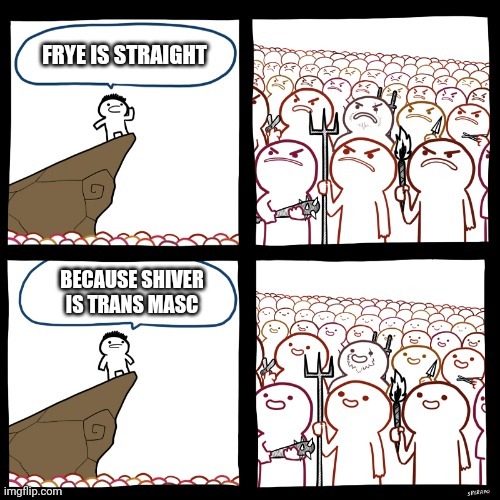
8. Conclusion
Deep Cut's only been out three months and I've already written this much about their lore, good lord. I'm an artist who works on Splatoon fan fiction so the story and themes of Splatoon matter a lot to me as they influence the direction of my work, but my god, does Deep Cut give me a lot to work with. Some of this will have to be retracted as we learn more about Deep Cut's lore, there's lots of ways Nintendo can introduce canon to contradict my take, and that's fine GIVE US THE LORE. Regardless I plan to be making more Deep Cut fan content in the future and I really wanted to share the information that my future work will be based on.
1K notes
·
View notes
Text
Why was Lelouch's manipulation effective on Rolo?

One of this year's "resolutions" I set for my Code Geass page was that I was going to give more space to Rolo. Rolo is my favorite secondary character in Code Geass, even above Shirley and Euphemia, but I haven't talked about him much and I wanted to rectify that. This Monday I published a survey to my followers in which I invited them to vote for the analysis of Rolo that they were most interested in me doing. There were three options:
⭐Why was Lelouch's manipulation effective on Rolo?
⭐Why did Rolo kill Shirley?
⭐The parallels between V.V. and Rolo
There was a close competition between the second and the winner, which is what you can read in the title of the publication. Don't worry if you didn't win the analysis you wanted because those analyzes will come gradually. Furthermore, there is an important point in common that we must take into consideration in the two most requested analyzes: Rolo's background.
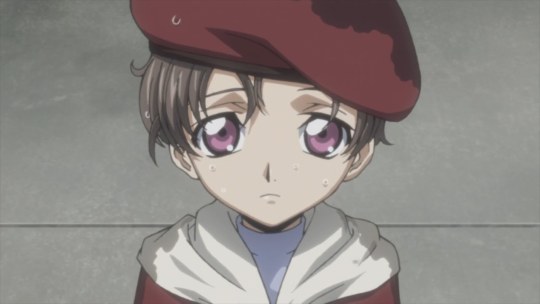
So who the fuck is Rolo? He is a trained assassin who works for the O.S.I. which, in turn, is in connection with the Geass Order and both organizations answer to the Emperor and V.V. (the devilish brothers). Episode 3 of R2 gives us an overview of him and how he normally acts if Lelouch is not with him (yes, being Lelouch's shy and devoted brother is Rolo's mask, but, as a professor told me in a class a while ago, masks are not necessarily fake and this mask is actually a side of him that not even Rolo himself knew). At the same time, episode 3 drops some seeds (problems) that will bloom over the course of the season:
His extreme loneliness: Rivalz casually comments that Rolo does not talk to anyone at school and, additionally, we see that it is difficult for him to work as a team (there is a scene with Villetta in which the members of the O.S.I. complain to her because Rolo has killed some of them for stupid reasons). All of this results in his poor social skills and him distrusting everyone (and himself). I won't use the enneagram right now, but Rolo is undoubtedly a 6w5 one-to-one subtype and with that information, a connoisseur of this tool can get a general idea of the motivations behind Rolo's strange behaviors.
His budding interest and need to understand the meanings of "having a family" and "birthdays," which tie into the heart-shaped locket that Lelouch gave him (and for which he killed a member of the O.S.I. just for touching it). It isn't until we reach episode 4 of R2 that we are introduced to Rolo's past that we understand this curiosity he has.
Rolo and Mao are similar in several ways. They are both orphans, given a Geass that was too powerful for them at a very young age, and are amoral as a result of their particular lives. Specifically, Rolo wasn't raised as a human, but rather he was trained from birth to be a killing machine. Therefore, he has no social skills or moral codes, he has no notion of what is right and wrong, he has never had a family, he doesn't know how to make friends and, of course, he has no idea what love is nor does he know how to love (this last part is important because that's what his narrative arc is about, by the way).
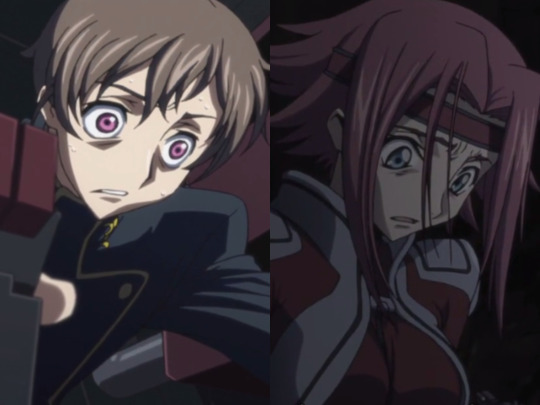
Rolo was taught to follow orders, solve problems and repress his social, emotional and affective needs. Rolo has convinced himself that it was okay for him to live as he has been because he has focused on the present by completing the missions assigned to him. It's Lelouch who motivates him to think about the future and find meaning in life: "Rolo, what is the future? The future is hope. Without hope, your life is empty. And you have no hope beyond your mission. Rolo, if you capture C.C., what kind of future will it open up for you? Things will remain as they are and nothing will change." It's more or less the same situation that Kallen goes through in the first season since she also has to define her objectives and motivations and, in fact, the mental breakdown that Rolo suffers is similar to the one that Kallen had on Kaminejima Island because both they see how the lie that they believed to be true crumbles before their eyes. In Rolo's case, after all, Lelouch does care more than the mission (or, in other words, that his emotional ties are real).
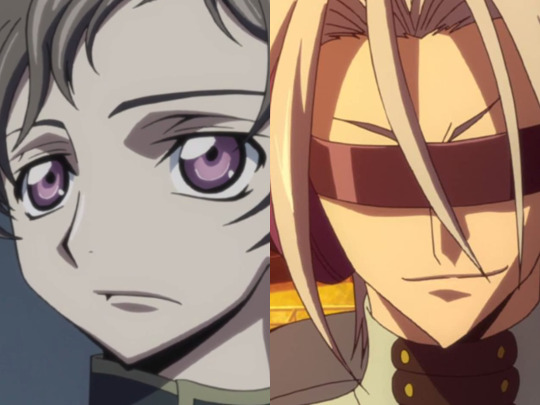
The difference between the two is that Rolo isn't mentally healthy and here we find other parallels with Mao. Both are, first and foremost, victims of child abuse by people who should have protected them, but decided to use them for their benefit (C.C. in the case of Mao and V.V. in the case of Rolo) and both are hungry for love for their loved ones (C.C. and Lelouch respectively). I would add that they are also children who didn't grow up well. That's why Rolo's locket is shaped like a heart: it symbolizes the love (of Lelouch) that Rolo desperately wants.
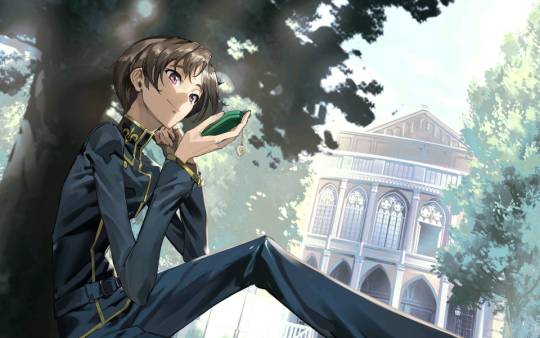
Even if Rolo sees himself as a weapon because he has been dehumanized by the Geass Order, he is human and, like every person, wants to be loved (C.C. literally wants to die because she believes there is no love in her life). This need combined with Lelouch's search for meaning based on his agenda (being his little brother) leads Rolo to turn such meaning into his reason for living. "I made you a promise. I promised you a new future. Your future is with me" (or, what is the same, "your future is me").
Of course, there is a difference between Mao and Rolo (which is the same difference between V.V. and him) that I won't reveal now. I will say that, although the relationship between Rolo and Lelouch will evolve into a dependency on the boy's part that will aggravate his mental state, it constitutes a turning point in his narrative arc since, in addition to giving him a goal and motivation, this is the first time that Rolo thinks about himself and what he wants for himself, which is good for Rolo since he begins to value his life and Lelouch won't face consequences for manipulating, lying and using an amoral young murderer with strong emotional deficiencies who has been indoctrinated by a malevolent organization, right? RIGHT?!
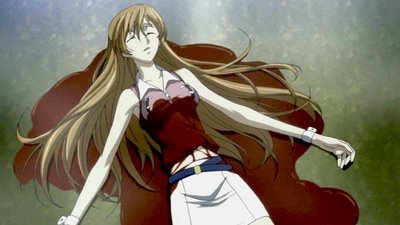
No, forget it. Shirley dies.
But I'll reserve that for the next analysis. Honestly, I'm glad this analysis came out first because when I release Shirley's I'll be more direct in touching on Rolo's background and focus on Rolo's fears and feelings and explaining something nonsense called "anxious attachment." React and share, if you want to see it soon, as well as other analyzes of Rolo (I need to analyze his death scene because it is heartbreakingly beautiful and meaningful, even more so with the music).
Thanks for reading me.
#code geass: lelouch of the rebellion#code geass#code geass: hangyaku no lelouch#lelouch lamperouge#lelouch vi britannia#lelouch#rolo lamperouge#mao (code geass)#kallen kozuki
50 notes
·
View notes
Text
as an aspiring storyteller & writer i find analyzing what works & what doesn’t work in media to be incredibly important. not only does it help us realize where we may have made mistakes in our writing & how to improve going forward, but it also helps understand why certain stories work so well. it helps us realize why critically acclaimed media is so critically acclaimed & appreciate the thought, care, & intelligence that went into making it so special. without criticism- all that thought loses its meaning. bland stories become indistinct from the incredible ones & all the deeply well thought out plot points & messages wash away into a sea of poor &/or lazy writing. we need criticism to appreciate strong writing. being critical of your interests- whether it be a highly acclaimed film or a weaker piece of media that you hold deadly despite its flaws- shows maturity, media literacy, & overall the beauty of how different stories resonate so deeply with people regardless of its issues. that’s why the way Vivziepop responds to criticism irks me on such a strong level. Helluva Boss is a very poorly written show (in my humble opinion, at least). Season 2 has retconned a ridiculous amount of things established season 1 (most notably Stolas’ entire character), has a massive problem with maintaining tone, jumps around from plot to plot by introducing new threat after new threat only to abandoned that threat by introducing a new one the next episode, struggles with developing its own main & supporting characters, & perhaps most offensively of all often comes off as downright fetish-y of gay men. These are all valid criticisms, all of which Vivziepop tries to dismiss as “baseless & unfair”. She claims she respects fair criticism yet never makes a distinction between what is fair & unfair, treating everything as the latter, going on twitter rampages where she attempts to defend her writing decisions & ridicules anyone who dare challenge them. If Vivziepop believes she’s writing the show in the optimal way, fine. If she doesn’t want to listen to criticism & continues to take Helluva Boss in the direction it’s currently going, fine. so be it. She’s in such a unique position where she’s so close to her audience & actively listening to their criticisms, I personally don’t understand why one wouldn’t try to take advantage of that to better their show, but at the same time I can understand having a set story in mind & wanting to take it your way despite what anyone else says. It can be frustrating to have everyone telling you you’re doing your passion project wrong- i get that. but in that case- just continue writing the show how you want, ignore the criticism, & stop having hissy fits on twitter calling people homophobic for not liking your writing (seriously what the fuck? that’s laughable of her to saying given how she writes her gay characters, just saying). Your writing should speak for itself, you shouldn’t have to defend it by crying on twitter. Dismissing all criticism & trying to paint the narrative that you’re nothing more than a victim with a hatedom out to get you is BAFFLINGLY immature ESPECIALLY as someone in their 30s. It only bothers me so much because she’s actively fostering an environment that dismisses criticism which i think is genuinely harmful. & as much as Helluva tries to be an adult show, let’s be real here, a majority of its audience are teenagers who look up to Viv & if THIS is the mindset they end up developing surrounding criticism I think it could genuinely be a problem in regards to their media literacy in the future. People can like Helluva Boss, people can ignore its flaws, but that kind of relationship with criticism is not healthy. at all.
#let me be clear I don’t think Vivziepop is gonna cause the death of media literacy or anything. that’d be ridiculous#but as an aspiring writing myself & someone who dreams of creating an indie internet show like her it really is disheartening to see#also if you disagree with what i said or enjoy Helluva then cool. enjoy yourself /gen#I’m not trying to start fights or drama with this post. it’s just my personal opinions & i wanted to put my thoughts somewhere#helluva critical#vivziepop critical
136 notes
·
View notes
Text
Jake Windsnap as an Enabler in Book 4
In the fourth book of the Emily Windsnap series, Jake Windsnap’s character exhibits traits that can be interpreted as enabling behavior, particularly in his interactions with his daughter, Emily. To understand this dynamic, we need to analyze several aspects of his character and actions throughout the narrative.
1. Lack of Boundaries: Jake often displays a tendency to prioritize Emily’s desires over setting appropriate boundaries. This is evident when he allows her to engage in risky adventures without fully considering the potential consequences. For instance, when Emily expresses a desire to explore dangerous situations or interact with characters that pose risks, Jake tends to support her decisions rather than cautioning her against them. This lack of boundary-setting can lead to Emily feeling emboldened to act impulsively, knowing she has her father’s backing.
2. Supportive Yet Overly Lenient: While it is important for parents to be supportive, Jake’s approach sometimes crosses into being overly lenient. He often agrees with Emily’s plans and ideas without challenging her thought process or encouraging her to think critically about her choices. This can create an environment where Emily feels she can do no wrong, which may contribute to her making poor decisions throughout the story.
3. Avoidance of Conflict: Jake tends to avoid conflict with Emily, opting instead for a more relaxed parenting style that lacks firmness. When disagreements arise between him and Mary regarding how they should parent Emily or handle specific situations, Jake often sides with Emily or remains neutral rather than taking a stand that might help guide her towards better decision-making. This avoidance can reinforce negative behaviors in Emily because she learns that she can manipulate situations without facing significant pushback from her father.
4. Emotional Support Without Accountability: Jake provides emotional support but fails to hold Emily accountable for her actions when necessary. For example, during moments when Emily makes choices that lead to trouble or conflict, Jake may comfort her but does not always address the underlying issues or encourage her to take responsibility for those choices. This pattern reinforces a cycle where Emily does not learn from mistakes because she is not faced with the consequences in a constructive manner.
In summary, Jake Windsnap’s enabling behavior in Book 4 stems from his lack of boundaries, overly lenient support style, avoidance of conflict, and failure to hold his daughter accountable for her actions. These traits contribute to an environment where Emily feels free to act without considering the repercussions of her decisions.
Top 3 Authoritative Sources Used in Answering this Question
Kessler, Liz - The Tail of Emily Windsnap Series: This source provides foundational information about the characters and their development throughout the series.
Kessler, Liz - Emily Windsnap and the Monster from the Deep: This book offers insights into character dynamics and relationships within the context of parental influence on children’s behavior.
Kessler, Liz - Emily Windsnap and the Castle in the Mist: This source explores themes related to family dynamics and decision-making processes among characters within the narrative framework.
7 notes
·
View notes
Note
First off i wanted to say i appreciate you always sharing your true opinion without muddying it up too much or trying to appease people. The honesty is very refreshing!
Okk anyway i keep seeing this take going around and wanted to know your thoughts on it (i have my own, but):
Leon in infinite darkness asks shen may out to dinner once and then later is looking forward to dinner with Claire. Do you see both of these incidents as platonic? The first one reads as flirting to me and the last one seems like an intentional ship tease from the writers (before uh, yknow, making the encounter end on a sour note... look, that one hug they share when leon saves her is ship tease 100% they know what theyre doing)
A lot of people seem to think he is just innocently wanting a meal and I kind of get that vibe with Claire I guess but... ... ... ANYWAY what are your thoughts. I think people are just simply afraid of whore leon
The way I look at it is that my goal first and foremost is to analyze the story text in a serious way -- and it's impossible to have a productive conversation about narrative, characterization, and use of literary tropes if I treat every single possible interpretation of the text as valid. There needs to be some uniformity to what I'm saying, or else there's no point in having the conversation.
That, and I also feel like there's no point in having this little community at all if we can't be honest with each other. Friendships aren't built on uwu. They're built on a sincere exchange of common interests and ideas.
So, I'm really grateful that we've all found each other. It's been so fucking awesome to meet so many people who are genuinely interested in a literary analysis of RE's story and want to brainstorm ideas and piece through things together as a team -- because this has never been my experience in RE fandom before, over the full 25 years that I've been here.
I love u all very much ❤
Ok, so as for your actual question --
I pretty much agree with your interpretation of what's going on there.
People really need to get the fuck over this weird, puritanical pearl-clutching they're doing and being scandalized by OG Leon being a slut canonically. OG Leon tries to fuck Hunnigan at one point, for god's sake.
Because, like. If you try to handwave away or whitewash the way that Leon is pure testosterone; he's a walking hard-on looking for a hole throws himself at people, you're erasing and overlooking a really big part of his character.
Leon is lonely and he fucking hates himself.
The way that this manifests/the way that he expresses this is different between Remake and OG, but that fact about him never goes away. Remake Leon puts up walls and self-isolates as though he's trying to protect everyone around him from the misfortune of having to know him, but OG Leon does the opposite. OG Leon is constantly giving more and more of himself away in the hopes that, eventually, there'll be nothing left.
So, there's a few different things going on there when he asks out Shen May and then Claire in ID.
With Shen May -- yes, he is actually asking her out. That is a legitimate offer for a date that he will go into with the intention of putting the moves on her and having it end in sex.
He does this not just because she's a hot girl -- though, of course he does think she's a hot girl -- he does it because he feels enough of a connection to her that, if she were to go out with him once, he could use that as a way to trick himself into thinking he's still worth other people's time -- even if for just a few hours. Again: he's really fucking lonely. No one person ever stays in his life long enough to form a meaningful relationship with him (platonic or otherwise), but if he can take a girl out to dinner -- hey, that's something, right?
And if he were to actually fuck her, he'd be able to lose himself in her wants and desires for long enough that he can forget how much he fucking hates himself. If he were to feel her hands on his body, he would actually feel wanted for a change. And if he were to make her come, he would feel needed -- and, if he were to make her come more than once, that would be even better. (Remember: Leon is "The Protector." He needs to be needed. He's probably the master of foreplay and will tease and touch and put his mouth on a partner for well over an hour before he actually fucks them.)
And, ever since being kidnapped by the CIA, the only way that Leon has ever been needed or wanted or useful in any way has been through physical means and the use of his body. That's why he defaults to sex as a coping mechanism before he gives up and just starts drinking. He might not have any value as a person, but as a physical body and an object -- well, that's a different story.
Leon objectifies himself, is what I'm saying.
With Claire, though, it's a little bit different.
Yes, it's ship bait -- but it's very mild ship bait, because the context for this one is way different.
Leon isn't being sincere with Claire when he says what he says. He knows that Claire didn't call him or meet up with him because she wants to go out with him or is looking for a booty call. He's not stupid (mostly).
Leon is being sarcastic and self-deprecating when he tells Claire that he was hoping she was going to want to get dinner with him. It's a sad joke to him, because, in his mind, the thought that Claire would be interested in him at all is actually ridiculous.
Because Claire knows him in ways that Shen May didn't. He can't charm his way into Claire's panties by pretending that he's something more than -- or that he's someone -- that he's not.
Claire doesn't need him -- Claire has never needed him, and Leon has absolutely no reason to believe she wants him, either.
What good is he to her, really, when she already knows the truth? She knows that Leon's only real use is as a weapon -- that he's not good for literally anything outside of an active bioterrorism situation. She knows that he fucks up everything he ever tries to do in his personal life. So, why would she want him? Why would she ever want him?
She doesn't. That's why she's about to disappear from his life again for maybe another six years. Maybe more. Because he's not worth being around.
At least, that's what his brain tells him.
It's a really self-defeating mindset that turns into a self-fulfilling prophecy.
Him talking about getting dinner with Claire is a joke, and the punchline is his own opinion of himself.
#resident evil#leon kennedy#meta analysis#every time leon looks into a mirror he hates what he sees#and while he can wear a mask around strangers#he can't around claire#she sees exactly what he sees when he looks at himself#and his own self-loathing tells him that she must hate what she sees as much as he does#when honestly that's probably not the case
56 notes
·
View notes
Note
Hola 💗 I really love your content 😍 that's why I come and go all the time, I come to ask you something else and my point of view :)
The truth is that I have always believed that Nene is going to die in the end because there are many things that point to that, if it happens I think it will be one of the strongest things that we will see in the manga, AidaIro is dramatic and crude, Nene is the most human character, that is why she is considered less important but her importance is really extremely great, she is one of the pillars of the story, so seeing her die she will be very strong.
Especially how everyone who knows her will take it, she wins the affection of people easily, she has interacted with the most misunderstood teenagers, she saw the pains, desires and regrets of the specters, they have liked her, Hanako is in love with her, you could say that she is a friend of Mitsuba, she was a friend of Sumire, Shijima-San supports her along with Tsuchigomori, even Yako, a constantly furious being, likes being with her and Tsukasa approve her, I asked me how she will get along with the mysteries No.1
But hey, you can see the importance, I wondered how she will die and how it will affect the characters and the story?
Oh, Thank you sweet 💗💗 >.<
Yashiro is the protagonist and it's no surprise. She is the most important piece in the story. Without her, Hanako would remain alone, Tsukasa would not return, the seals would not be removed, lives would not be saved, Kou would not know Mitsuba, because if there is no Tsukasa, there is no Mitsuba. The fate of the twins would not have been changed.
It suggests that the twins were waiting for her arrival to begin their goal, and of course, these goals have consequences, whether good or bad. In any case, the twins could only move forward with her. Tsukasa didn't kidnap her for nothing, he needs her too.
Yashiro was narratively constructed to seem weak and useless, a little girl who was naive and got involved with the supernatural, but that's not what it's about. She is one of the key players, and if you analyze everything she did, it had a consequence. She prevented Kou from exorcising Hanako, he started to want to better understand supernaturals.
Hanako is no longer as cold as before, I could mention all the changes in his behavior but I would spend the whole day. She saved Aoi several times (even without Aoi knowing), she showed Sumire what freedom was (when she took her from that village) wow, if I'm going to say everything this post will be just for that hahaha.
Nene's death is destined, so there is no way to save her unless specific methods are used to do so. They can use Tsuchigomori or the god. In both cases a sacrifice is necessary. In the case of Tsuchigomori he would sacrifice himself, and in God's case, they would need to remove all the seals.

There is a third alternative, going back in time. In the latter, there are some possibilities for her to be kept alive, either by stopping her time, or going back in time to change something, or in the last resort, going to the future to prevent her from going through the event that will bring about her death. .
Apparently, Hanako is thinking about the possibility of using the time to their advantage.
About what her death would be like, I have a theory about it, if you want to see it, take a look at this post here.
I'm going to summarize the post I mentioned above, basically they need to remove all the seals, after these seals are removed something will happen (the last cursed seal will break) imagining that the cursed seal is Hanako's, which is the only one that has a seal and isn't a yorishiro, so we assume Hanako is going to transform into something dangerous.
Yashiro manages to purify, and you see that when she does this to Tsukasa, he "melts" a little. On other occasions, such as in the mokke of the dead chapter, she purifies all the students at once.
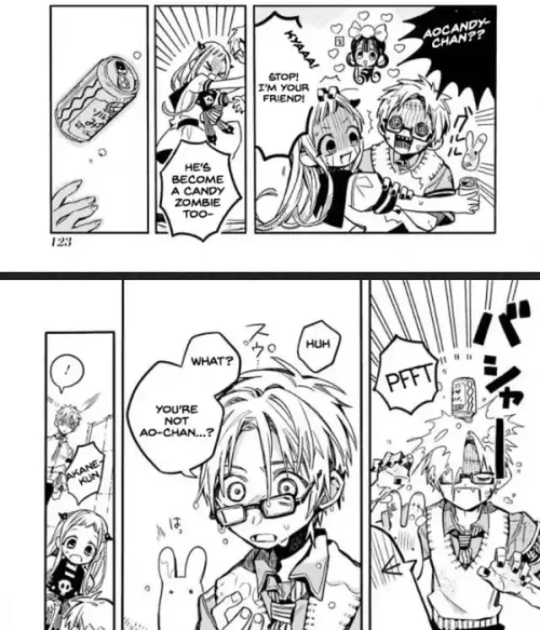
So I imagine that she will try to save Hanako, but he, who has no control over himself, will end up killing her in the process (like he did with Tsukasa), she will manage to save him, but when he realizes what he did , will ask Kou to exorcise him.
I explain better in the post I mentioned.
The second hypothesis is that it is used as a sacrifice to the God, to grant a wish. Although the Kannagis don't actually die, they are trapped in the house/abyss. Yashiro actually dies, so I wonder if this hypothesis is so valid.
We saw how her body became lifeless and there were no signs that her soul would be present at the place, or the fact that she didn't remember anything after Mirai advanced her time, that is, she won't be trapped anywhere like the kannagis stay. Tsukasa was also sacrificed, but he remains in the house, meaning Yashiro actually dies, there is no return for her.

The ways that Hanako found to save her included locking her in a safe place, where nothing bad could happen to her, that is, while she was there, no supernatural would attack her or there would be no way to get her out of there to use her as a sacrifice. She also wouldn't risk her life trying to save Hanako, because she would be with Amane from the PP arc.
He made a wish to God and asked for her life span to increase, that is, he changed her destiny when he made her live longer than was intended. So even if she was in danger, she wouldn't die. Remembering that Hanako removed her from the supernatural world, Aoi's sacrifice closed all the doors, meaning she wouldn't be there if Hanako transformed and attacked her.
We're still going to see more of his attempts to save her, and I believe that in this current arc we will too.
Nene's death will mainly affect Hanako, and if Hanako loses control… That will be problematic.....
I hope you liked it, thanks for the ask! ♡
#jibaku shounen hanako kun#hanako kun#amane yugi#toilet bound hanako kun#hanakokun#jshk#tbhk#aidairo#jshk spoilers#yugi twins#hanako anime#hanako x nene#tbhk hanako#jibaku shoujo hanako kun#jshk hanako#yugi tsukasa#yugi amane#nene yashiro#yashiro#yashiro nene#jshk theories
25 notes
·
View notes
Text
I’m sorry, when will people get it through their fucking heads that saying El isn’t ready for a relationship isn’t ablest. Don’t just throw words around because they benefit your narrative. El is a fictional character that is shown to have grown up in a lab her entire life and has only known abuse. She has never existed in the real world and her childhood was stolen from her. That’s why she’s not ready for a romantic relationship. Watch the goddamn show and just stop saying shit without knowing the damage/effect it can have.
Ableism is serious, it needs to be discussed with respect and not as a way to make a completely wild point just because you don’t like how people are understanding El’s character. A fictional character that isn’t real and grew up as a science experiment is not ready for a relationship. She wasn’t ready when she only just got out and had a father figure for the first time. She didn’t understand what is was like to have her own opinion and style until Max showed her and gave her a chance to exist as a person and not a weapon or someone’s girlfriend/daughter. People aren’t just saying she’s not ready for a relationship without evidence and factual stuff taken from the show. Stop throwing heavy words around without giving a shit about the actual issue of ableism. El is struggling to understand social cues, struggles in school, etc. because she’s literally never been a normal child before because she grew up in a lab. Like what is not clicking? She grew up in a lab, like shit we got her whole back story in season 4 and got to see exactly what happened to her and what it was like, did people just not watch that? I’m sorry it’s very frustrating, I cannot stand when very serious issues are used as little tools that people can throw around to fit their opinion.
They said in a post (tik tok, not shocked) Saying El isn’t ready for a relationship is ableist, do your research.
Like dude….you need to get off your fucking phone. Stop using things real people deal with as something to just throw around with characters that aren’t fucking real and aren’t even confirmed to have (they said autism so I’m using that) autism in the show. Of course you’re allowed to have your opinions and believe that she is, that’s totally fine, but that’s still a headcanon. El Hopper was not confirmed to have autism or anything else actually, she was confirmed to growing up in a lab her entire life and then being further traumatized after that. I’m sorry, it’s very frustrating, cause saying that stuff takes away from the seriousness of actual ableism and it diminishes the word. Headcanon her as being autistic, shit do it for all of them I love that and support that, but to then go around calling people ableist for analyzing their characters is ridiculous because it is still a headcanon and not confirmed by the show.
You’re going through a lot of hoops to even get to the point of:
El isn’t ready for a relationship=ableism
#byler#stop throwing words around#if anything said is offensive or taken the wrong way please let me know#I want to respect everyone
79 notes
·
View notes
Text
The Problem With the Harem Childhood Love
"I met this girl a decade ago and she changed how I viewed everything. We only knew each other for a single day but I know she's the one."
"Oh, so you two are easily going to have the most chemistry of anyone in your own story if you were to ever meet, right?"
"Why would we need that? I've already made my mind up a decade ago that I love her. So long as I say that, I can get with her at any time."
And then I start staring at the writer across from me until they finally leave because of the cardinal sin they have committed: Writing while assuming the ending.
Let me elaborate: It's actually a good thing for most stories to know what their ending is. It allows for better narrative planning and build up so that each block of your story can build on one another. Foreshadowing is only possible by knowing what plot points are coming up. Some writers can go by the seat of their pants and plan on the fly like the late Akira Toriyama and still have something coherent but it is usually considered better for a narratives pacing to know what it is.
This isn't about that though. It is when a writer knows what is coming and assumes it as self evident. This is almost always a bad thing to do because if you assume something is self evident, you'll put less narrative work into justifying it. You get this a lot when a character seems to only know something because the author says they do or they run off to a specific place without any real reason because the writer either thinks that's already been justified or because they just need that to happen for the sake of the plot.
Romance is the genre where this problem is at its worst with a pretty clear lead over most other genres. This is mostly due to two elements: Genre and the 'nature of love'.
Let's tackle the second one first since genre is going to come up more importantly with this specific trope. Love is seen oftentimes as mysterious and essentially impossible to explain. We fall in love. We slip into love. We find our soulmate. Many forms of romantic literature doesn't frame love as a choice but as an inevitability which isn't actually a bad thing. It's part of the appeal. Part of why Hallmark movies are as popular as they are is because the idea of one day having someone crash into your life, fill you with what most consider to be the best feeling in existence and change your life for the better is pretty damn attractive.
If you have watched a Hallmark movie though, you will often look at one half of that pairing and go "Why the hell are you interested in this person?" I've literally been told off in the past for analyzing why a character loves another character (positively even btw which made the reaction incredibly confusing for me) because it's like... Love man. You don't gotta explain it. If they say they're in love, they're in love!
Yes, that is undeniably how reality works but this isn't talking about reality. It's talking about fiction. In fiction, characters are theoretically supposed to have motivations and personalities and if you never sell your audience on why your two romantic leads would theoretically want to grow closer with the other one, besides lust, then it's not going to be a truly engaging romance. You don't even have to interrogate it that hard. We have tried and true ship dynamics for a reason to help with this because how those dynamics play off of each other commonly showcases why they would like each other. That doesn't mean you can just present the ship dynamic either but it can help give you a proper baseline to work from.
Second: Genre. You're reading a romance story so of course the main two characters are going to get together. If the story is not about that then you're not writing a romance. That mindset of it being a genre necessity and a foregone conclusion is already a death sentence for a lot of romance works. After all, they're together, they're your leads, you had them blush a couple times around each other, jobs done, right?
WRONG! It is still your job as a writer to sell us that they got there naturally and believably. There's a reason this is a GENRE. Part of why romantic subplots suck in so many things is because romance is seen as this thing you can just throw in a story easily and then walk away from because you said it happened so it did. Love is such a complex topic, and the process of falling in it so compelling and powerful (or if you're even braver, the process of dealing with those feeling after the confession) that it can carry a story entirely on its own. This is also because love is such a powerful emotion, terrifying in that strength and its mystery, and a relationship such a big commitment that someone actually deciding to go through with either is a genuinely big deal. There's lots of people out there, and not just those who are aromantic, who don't understand why we fall in love because it's absolutely fucking terrifying and you lose a lot just to gain a romantic partner, at least if you look at it derivatively.
BUT! What if you could write yourself an out of all of this complexity? Better yet, what if this out could allow you to expand your cast to a frankly ludicrous degree for a romance story while still making who wins make narrative sense? How glorious would it be if you could make the final question not "Who does the main character like most," but instead "Who is the one he was destined to be with?"
Enter the trope at the top of this blog. Harem stories are frankly a touch terrifying to write. As someone who has done three different erotic takes on the genre, I have fucked up one of three SPECTACULARLY and my other two are taking cheats of their own to get around some of the ensemble problems of a harem. Because this blog is already going long, I won't get into hard why harem writing is difficult or why its protagonists are the way they are here but uh... Yeah, there's a lot to unpack there and it's not all for wish fulfillment. I mean, it's a genre with a lot of wish fulfillment too but there's still other reasons behind it.
The core thing that makes them a struggle though is that time is your explicit enemy. An ensemble cast always consumes time in a way that few are always ready to deal with. You may want five main characters but you may quickly realize that only three are any good or that to make all five good, you're going to need add another season to your show, volume to your manga, etc. like that because expanding on each character, especially equally, is a big ask. Again, romance as a genre normally deals with only two main characters for a reason. The question of falling in love is bad enough when you have to sell a relationship with one character, let alone three or more. Even worse if they're all supposed to be seen as equally valid options.
So how do you pick one over the rest? Well, if you're not a coward, you make them into a polycule but as that's not all that socially acceptable and not a lot of big harem works have gone that route, you aren't going to see that option too often. Instead, you need a final plot beat/arc that will make it crystal clear who the choice is and why.
And what better way to do that than with some predestination!? Yeah, this trope actually has a crap ton of problems. The fact that people change from when they were kids, the fact that promises made when young should not define your entire life, etc. like that. That all can be said to be like saying that implying a high school romance will be forever is stupid though. That you're already clearly against the genre or the romanticization of love and so your opinion is skewed.
That's why my complaint is the one it is. See, this sort of excuse makes it so you can say that one of the girls in a harem was always the one and it's in character and fuck EVERYTHING up in the process. After all, with such a... profound eye roll explanation as this, why do you need to build their relationship? You have two to four other girls, potentially even more, to explore, tease and string along until finally getting with the one left out. They don't need chemistry even more than a normal romantic couple because of this singular moment in the past.
And if you, as a writer, actually believe that, you deserve to be smacked. All you're going to do is piss off essentially your ENTIRE audience who got invested in these other characters, who you told them through narrative to care about and get invested in, because the one they were told didn't matter was actually the one they should have been watching out for. Even if it's explicitly clear from go who it is, if your entire audience hates them then they're still going to throw away your story because of the bad taste the last bite leaves because you somehow chose the worst member in your roster to be the one that deserves the happy ending while the rest can eat shit.
And the reasonable argument against this complaint is that if you're that invested in the rest, the author still succeeded. It's the journey that matters, not the destination, right? Well... Actually, romance is the genre where that is the least true. It's why romance stories end with implying a happily ever after because treating these two that you've come to know and care about as just a school yard fling makes all those sweet moments, all that care and growth, seem meaningless and cheap. Like it was all for naught, especially because of how desirable love is for most people and how devastating heart break can be.
So if you can't even go "At least one of the ones that deserved it got their happy ending" then it can make all those moments of harem fun just feel all the more painful. Like the hand of the author is holding a knife to your back, waiting to betray you at any second. That is a feeling that will leave very few in an audience happy, at least if they genuinely care about the characters and romances you've written.
And all because the writer assumed their brilliant excuse was all it would take to make you agree that their ending made sense.
======+++++======
This blog is brought to you today by Quintessential Quintuplets, an anime I couldn't finish because while I don't watch much harem stuff, I could still clearly see that every girl who deserved a happy ending in that show wasn't going to get it, even before being told who got with the MC in the end. It's also somewhat brought to you by me working on the concept of a harem story and my musings on some of its specific tropes. Again, I could do several blogs on it frankly. Shocking, I know, that the romance writer has thoughts on romance genres.
(Also, if you're more immune to this problem than I am, Quintessential Quintuplets is worth your time. It's not perfect but I did find the cast compelling and charming enough to get worked up about them and there are some really smart narrative choices made along the way.)
I have a public Discord for any and all who want to join!
I also have an Amazon page for all of my original works in various forms of character focused romances from cute, teenage romance to erotica series of my past.
I have an Ao3 for my fanfiction projects as well if that catches your fancy instead.
If you want to hang out with me, I stream from time to time and love to chat with chat.
A Twitter you can follow too
And a Kofi if you like what I do and want to help out with the fact that disability doesn’t pay much.
6 notes
·
View notes
Text
So I saw the Spy Family movie.....
And because I love Spy Family, I decided this was a good chance to try a 4D experience.
It did not work out for me.
For the first forty-five minutes or so, I was convinced that it was the 4D experience detracting from the movie.....but as I grew more used to the sensory overload, I started to realize it was not just the 4D but the movie itself.
So to spare my SO and other friends from being inundated with walls of texts analyzing this movie, I've brought my thoughts to Tumblr where I will slice open this movie and extract its shit (SPOILER) just like the villains keep threatening to do to Anya.
This is very much a spoiler post. My only spoiler-free thought is that if you are more in it for the animation, it's worth checking out. If you are more compelled by story and relationships, then spare yourself. If you saw it and liked it, I'm happy for you and this is not me trying to change your mind.
For me, this movie was a crime of Writing That Does Not Understand The Source Material.
Let's go small, and build up to the bigger crimes of this movie, shall we?
Who am I kidding, it's because one of the strangest, yet funniest, parts of this movie is the first thing I want to talk about. But before I get there, I want to acknowledge that the writers of this film were visibly operating under certain constraints.
Part 1: We've Gotta Get the Whole Cast In
I have no idea whether this was a constraint imposed by the studio or one of the film-specific producers or what, but clearly someone somewhere wanted a movie which had a role for every single semi-regular character on this show.
So many of the problems with the plot of this movie can be traced back to the need to incorporate every single element of the extended cast, and only one of those cast members is allowed to be used as a joke (which is, of course, Franky).
I say "of course" because I think that narratively, Franky's involvement is the easiest to undermine as a joke.
But in fact I do feel that the reason Franky ended up being used for a throwaway joke highlights the problem with this movie, which is that it does not understand the characters.
Because the thing is, I had thought earlier in the movie that Anya was behaving in a way that she usually is only inclined to in the presence of Franky.
The story tries to give Anya this mini-subplot where she thinks that her parents are about to break up and matchmakes them. The story understands that this would display a better understanding of romance than Anya usually does, and so employs a flashback with Becky as well as Anya's comical mispronunciations to highlight that she doesn't really understand what she's dealing with or her matchmaking solution. But the thing is, Anya's matchmaking is usually done with Franky in tow. Anya coming up with a stereotypical matchmaking scheme on her own is...a little odd.
Of course, this also highlights how much shit this movie is just recycling from the show without understanding its context. But we will get there.
Part 2: Oops, Anya Ate the McGuffin
Listen, as a concept, this is hilarious. It was literally stored in food—and in a particular food that would be poisonous to Bond, such that in the scene where Anya accidentally eats it, I was desperately worried that Bond would eat it.
So uh...yeah. That's the plot. Anya ate the McGuffin on the way to the vacation to facilitate her learning to make a traditional sweet that will help her get a Stella....(which is a very convoluted plot even excluding the knowledge that a lot of us will go into the movie with that she will not get the Stella, since the movie will have to maintain status quo)...and the bad guys target her and wanna cut her open.
The most bizarre part of this was probably the whole Anya Needs To Shit sequence. This movie kind of had an inconsistency problem with imagined sequences, where some of them were drawn in that childish style to indicate that they were definitely imagined scenarios versus the ones that were illustrated exactly as the rest of the film which creates some troubling implications I'll get into in Part 6, but the Anya Needs To Shit sequence was both bizarre and glorious.
The animators were clearly having the time of their lives. Did it feel like someone trying desperately to find some content to fill airtime? Yes. But given the runtime and the very scattered nature of the story, I will definitely defend the existence of the Poop God sequence. It doesn't need to be there, but by being there, it gives this movie personality and character that it would be lacking otherwise. The rest of the movie is this paint-by-numbers hodgepodge of bits of the show and genre tropes (from shonen as well as family comedies) that, despite the feel-good moments at the end. Without this sequence, the movie would have no personality whatsoever.
So, on that front, it's great.
But at the same time, there is so much weirdness around this. For instance, it is used as a message to children viewers, "never take other people's stuff" without also addressing the issue, "you should brush your teeth."
Because sure, Anya went into that suitcase out of greed. But part of the motivating factor was Bond's foresight about the contents of the suitcase containing a treasure. The narrative pays this a lot of focus and paints the moral for children, "Don't touch other people's stuff". And yet after all that focus on Anya shitting out the microchip, it's stuck to her tooth and comes out with a sneeze???? And nobody even comments that Anya should have maybe brushed her teeth before now?
Please. Own your bizarreness. Let Anya shit out the microchip.
Part 3: Weren't We Supposed to Be Keeping a Low Profile?
Now, it's not unexpected that these movies recycle canon material and reuse highlights in different contexts.
But this movie seemed to forget that a core tenet of the Forger family is that they all want to keep a low profile.
And yet we get Loid openly challenging a military officer who wants Anya's cake, Yor kicking Loid out of a ferris wheel near the top and then, though the movie does not show us specifically, implying that she jumped out after him.....
Add to this the weird subplot that there's another more suitable person to take on Operation Stryx. It's like everybody has forgotten that the highest priority is not appearing suspicious.
Part 4: The 4D Experience
So, 4D probably just isn't for me. That's fine. It happens.
The flashing was particularly unpleasant, and I had to close my eyes during some of the gunfire scenes in the climax because all the flashing lights in the theater were just blinding.
Early in the movie, the weirdest parts were the way the chairs would vibrate in response to characters' reactions. It took me a while to get used to.
Even after I was mostly used to it, though, it was intensely weird to feel the center of the chair pulse rhythmically in time to Tobari's pulsing heart eyes. It made that scene feel way more horny.
I never got used to the little air darts they deliver to your ankles, which always felt like maybe the person behind me was throwing popcorn at me under the seat (even though these seats are too sturdy for such a thing).
I'd seen the warning that you get water sprayed at you, so that in and of itself did not shock me too much..though it did bother me that the first water puff I noticed came during the Poop God scene, which felt very gross. Subsequent water scenes just felt odd in that the characters are getting drenched while I was getting this light spray of water that reminded me of the Poop God.
-50/10 for me, even though honestly I was kinda there for the chairs shifting and tilting through the air battle scenes.
Part 5: So Loid Took a Bunch of Stupid Pills...
Wow, Loid sure forgot his priorities for a movie, didn't he? Haha...ha...
The thing is, I do feel like they were aware that the premise looked weird priority-wise for Loid and were doing their best to write in a reason why he would make the choices he makes.
So now not only is this about the chance for Anya to win a Stella through a pastry competition, it's also about getting to maintain his position in Operation Stryx, with the threat of someone else taking over the mission.
Except....none of this makes sense.
Even if they put another spy in position, why take out the Forgers?
And given that Operation Stryx remains the highest priority, Loid's priorities are deeply off throughout this movie, which act as if his time spent with his family are less important.
This is a point that canon is very good at balancing. Loid enjoys his time with his family, but he rarely simply allows himself to enjoy it, because it is just a mission.
The Loid of this movie seems to be one who is trying to balance family and work, which...may make sense for a version of Loid down the line who knows he values his family for real and views them as something real, but he is not there in canon yet. This creates a head-scratching storyline where Loid keeps abandoning missions for other missions with little to no understanding of the human emotions of the people he is dealing with.
Part 6: ...But That's Not The Worst Part
This movie wants to treat the Forger family as a dysfunctional family that does not communicate, more than a group of people with disparate goals who are pretending to be a family and in the process becoming an actual family. For the most part, this is a subtle distinction. But there are key moments when it is not.
What this movie did to Anya's abandonment issues is really what got to me, enraged me, and cemented it for me as a Terrible, Horrible, No Good, Very Bad Movie.
Canon takes a very delicate approach to Loid and Anya's relationship. Loid is using Anya, but Anya knows this because of her telepathy, and has fun being part of his spy work. Yor knows none of this, and when Loid pushes Anya too hard, helps remind him that she is just a child with human needs above all.
The movie contained a scene where Loid is trying to impress upon Anya the importance that she do a certain thing to get a Stella. Now, Anya understands Operation Stryx and knows how important it is. She knows her role in the operation and in the family, and is always trying her best. But in this scene, Anya expresses that she isn't sure she can do what Loid is asking. Loid, in response, thinks about how this will mean the end of the operation and thereby the end of the family—which spurs Anya into action.
This is the dynamic:
LOID: You need to do this thing.
ANYA: I don't think I can...and I don't want to.
LOID: [unconscously] Oh well, I guess that means the end of our family then.
ANYA: WAIT, please, I'll do it, I promise! I'll be good!
The implication is toxic and horrific, and goes somewhere that canon never has. In canon, Anya's knowledge of the mission balances the pressure Loid places on her, and Loid himself is more inclined to acknowledge the amount of effort Anya puts into things and make alternate plans that take her actual abilities into account, and that is what turns into increased motivation for Anya. This, unlike canon, is just emotional blackmail.
To make matters worse, the art almost seemed to be treating Anya's insecurities about her family as founded in reality, by not changing the art style on one single imagined sequence, and that sequence being the one where Anya decides to sneak out to buy the non-alcoholic cherry liqueur. (Which, isn't that just cherry syrup??? But never mind.)
There's this underlying feeling that the writers of the movie did not understand the role canon Loid serves as emotional anchor to Anya, nor that it is Loid and Yor's ongoing compassion, validation and support that are turning them into a family. The Loid of this movie felt incredibly cold and unfeeling toward Anya for most of the run of this movie in a way that canon Loid never does.
While he had some heartwarming moments toward the end, they did not make it up for me. If anything, they felt duplicitous to me, because they did nothing to address the underlying problems with Loid's attitude toward Anya for the rest of the film.
Frankly, I could even take issue with how Loid treated Yor, because he seemed to be trying to romance her organically in this film? Even though in canon, he only does so at this stage as a calculated plan, and generally they are business partners in their marriage.
The entire family dynamic was just a little bit off in a way that felt like fanfic written by a person imposing their own worldviews onto canon. Which, nothing wrong with that, except that this is an official movie, and I spent a few thousand yen to see it, to my regret.
Part 7: But Was There Anything I Did Like?
It wasn't like this movie has nothing to recommend it. As I've mentioned, the Anya Needs to Shit sequence feels like some animators and the voice actor of the Poop God were having the time of their life and I dig that despite the bizarreness.
Yor also deserves a shout-out. She really shone in this movie, not just because of her show-stealing action sequence with the machine gun cyborg and her clever-as-fuck strategy to blow him up with lipstick. Throughout this movie, Yor's desire to be a part of Loid's and Anya's lives was front and center.
I'm not a fan of the whole Yor thinks Loid is cheating subplot where it felt less in keeping with her usual MO of not understanding the "normal" social nuances and more like the writers fed her stupid pills because Loid was about to overdose, probably. But it was resolved fairly quickly and easily, and at the end of the day, that was not the focus of Yor's storyline in the movie. (And probably was shoehorned into the story to create a reason to include Yor's coworkers in the movie.)
Anya is adorable, as usual, but where usually Spy Family lets Anya be the one surreptitiously finding a way to save her family, in this movie, she was the liability and the damsel. I'm not opposed to such a scenario in general. I do feel that in canon Anya has too much on her shoulders, and even if her parents don't realize the degree of it, I'd love a storyline where Anya gets to be the one saved.
This was not that, but Anya does get to be protected, and even if I have a lot of issues with the details of how it was done, I figure this deserves a shout out.
Concluding Thoughts
If I liked this movie a little more, I would say I ought to see it one more time before refining my thoughts.
I still love Spy Family, enough so that even after seeing this abysmal movie, I am happy about the free stickers I got with my ticket, and opted for the Spy Family themed theater membership card.
But oh boy, this movie rubbed me so very much the wrong way that I have no wish to subject myself to it again.
Also, this isn't important, but was the ending implying that the south of Ostania has an ocean? Given how much canon parallels Ostania and Westalia to East and West Germany, I found this bizarre and it made me feel that the writers of the movie have very little understanding of the source material (well, more than I already did, since that is at the end of the movie, at which point there was already no salvaging my take).
Basically...this movie was Not It.
Don't spend money on it unless it's for the art.
#spy x family#spy family#spy x family code white#spy family code white#spoilers#loid forger#yor briar#yor forger#anya forger#movie rant
15 notes
·
View notes
Text
random Evangelion meta on how Shinji’s relationships affect the narrative
wowie look at me overthinking things again at midnight. Now i know what your all thinking: Evangelion is a clusterfuck we can’t ever hope to understand
valid. Anyway
yes it’s obvious the entire show focuses on Shinji’s mental state and by the climax every other cool thing kinda gets shoved to the side (at least in the original series and end of Evangelion movie). It’s a very disconnected love letter to shitty mental states and they added cool robots, useless love triangles and amazing worldbuilding to distract from that.
im going to be analyzing the moment where shinji laments that no one understands him and the other versions of the people he has deep connections respond with this(srry I don’t have pics):
Asuka:Nobody can ever understand you
Misato: the only one who can understand yourself is you
Rei: so you must take care of yourself
Each of these responses plays back into the core parts of their characters. Rei (is responding almost motherly since she is a clone of his mom without a soul separate from the EVA?)
After shinji expresses that he can’t love what he can’t under(himself) they then go on to say:
Misato: this is the present you
This live represents her striving to live in the present rather than past when her father that she hated saved her(which has determined all her actions so far in the series)
Asuka:People around the present you
The people around asuka is how she determines value in herself (she pushes them away and seeks validation from them at the same time)
Rei: Environment of present you
(Rei was created because the environment had need of her, need of a tool for the evas, an extension of naturally occuring creatures(that could change the world more than humans?)
Then they go on to stress the importance that Everything changes
Shinji is all of these characters and his interactions with them reflects what he represents
shinji is change itself throughout the series
Asuka is how he automatically assumes other people view him(worthless, mean to him)
He changed rei, helping her accept her emotions by getting her to smile, and she went against gendo and changed the world
He changed misato by being brave, and someone that she needed to change herself for(her care for shinji changed her hate against the angels above all else)
alll right that’s it srry for making u read all that. The hyperfixation took hold of me for minute there huh
#my dribble drabbles#2023#neon genesis evangelion#end of evangelion#shinji ikari#rei ayanami#asuka langley soryu#evangelion meta#evangelion asuka#evangelion rei#evangelion shinj#Evangelion character analysis#Character analysis#meta#long post
16 notes
·
View notes
Note
Clothing As Fate On Riverdale? SAY MORE
this #theory hinges on a reading of riverdale as comic, or at least riverdale as a show that still operates fundamentally on comic book principles.
in comics, appearance is everything. i mean this in the sense that characters are given distinct looks so that the viewer can easily tell them apart when scanning strips; i mean it also in the sense that since comics are largely a visual medium, we learn who characters are not only by analyzing what they say but also and principally by analyzing how they look. comic characters’ outfits rarely change, because their appearance is how we recognize them, and yet those outfits are significant despite being stable precisely because of what they indicate about different characters’ personalities. think of pierce from zits or pigpen from peanuts or nermal from garfield or — you get the picture; in a comic, appearance IS character and vice versa.
because we need characters to look distinct in order to tell us what they’re like, there are plenty of pieces of clothing in comics whose only function is to communicate something about a character’s personality; this is true in riverdale as well. jughead’s hat is a perfect example of this, given that the show is aware of its purpose — have you ever seen me without this hat on? that’s weird! but the place it’s not weird for a character to literally never be seen without the same hat on is in a comic strip; jughead just doesn’t know that he’s from a comic (yet).
in comics perhaps more than any other medium, clothes and physical traits are chosen to efficiently communicate characters’ existing personality traits, and so it follows that the reverse is true as well, in the sense that donning a certain piece of clothing can also serve to influence or alter a character’s personality or behavior after the fact. this starts to get at the idea of clothing as fate — the idea that wearing something particular has the power to influence or predetermine future events. we see this frequently time in riverdale when characters dress up like fictional characters only to begin experiencing the same plots that those characters did, e.g. betty dressing up as laurie strode and then immediately living the events of the movie halloween or archie wearing a superhero costume for one night and then becoming a vigilante or like. every musical episode. riverdale fundamentally cannot or will not distinguish between a character and someone who is dressed up like them, so dressing up as someone else triggers a narrative shift.
we need characters to look distinct when reading comics in order to be able to tell them apart, so it follows that when characters in the comic that is riverdale come to resemble each other too closely they begin to merge, which is to say they begin experiencing similar plotlines and ultimately similar fates. i have been mostly paying attention on this rewatch to the jasonification of jason’s doubles, particularly archie, cheryl, and chic, but there is also a lot to explore with regard to characters dressing like their parents while in the process of becoming them. (jughead putting on the serpent jacket is the first moment we know he is going to join the serpents; veronica ripping off her pearl necklace communicates more urgently than any words might how strongly she doesn’t want to end up like her parents.) we might even argue that using the same actors in the midnight club sealed the riverdale teens' fates as they became physically and therefore narratively indistinguishable from their parents, doomed to repeat their mistakes.
in summary, pretending to do something on riverdale is the same as doing it for real because everything on the show operates on an equal level of (un)reality; sartorial choices in particular take on additional consequence owing to riverdale's archie comics heritage. thus, in riverdale, dressing up as someone is not fundamentally distinct from becoming them, or at least taking on their narrative role. in this sense, then, clothing is a primary vector through which fate exerts itself on the characters, forcing them to experience plotlines that correspond to what they're wearing even if it was only supposed to be a costume.
42 notes
·
View notes
Text
creative works & links
AO3 - Ko-Fi - YouTube - Patreon
Novel
adult sci-fi; a queer, existentialist space adventure
Summary:
In the distant future, humans live in a utopia where even death is not the end—for everyone except Amber’s parents. At 25, she is a cynical, aloof Ph.D. in history who resents her sheltered life at home and yearns to find her place in the world. Then, an exciting job offer comes her way—the chance to uncover the mystery of a civilization that disappeared thousands of years ago. Teaming up with the archeologist Lullaby, Amber embarks on a hitchhiking quest to find the fabled Aquamarine Moon and, perhaps, some much-needed meaning in her life.
Publisher’s website | Amazon
Video Essays
"Science Has an Accountability Problem | Dumpster Fire Data"
Do you know how many researchers anonymously admit to fabricating data? The answer is not a number of individuals, it is a percentage. As scientists, we like to believe that we are the pinnacle of accuracy, honesty, and accountability. In reality, we are no different from any other human, just as capable of making mistakes. And it’s time to fully admit to that. Welcome to Dumpster Fire Data, a series in which I analyze the hell out of crumbling institutions.
“Representation DIY: What Headcanons Can Teach You About Autism”
On why representation of minority groups in fiction has such a powerful influence, why I prefer headcanon autistic characters over canon examples, and how headcanon discussions can improve the public dialogue and be an additional push for better diverse media.
“Night in the Woods: Cosmic Horror and Optimistic Nihilism”
An exploration of themes and narrative threads of “Night in the Woods” through the eyes of an exhausted Gen Z anarchist. On the terrifying world that young adults of today were born into and how it affected us, the two ways in which NiTW explores cosmic horror, why humans always look for stories, patterns, and meaning, and whether you can be sane and happy without meaning altogether.
“Disability and Capitalism” 2-parter
A deep dive into the intertwined history of ableism and the capitalist economy, starting from the dawn of humanity and ending with a hopeful look into the future. Featuring a shitton of citations/research and generously sprinkled with science fiction.
“Squid Game and the Gamefication of Capitalism”
"Squid Game" is a South Korean survival drama that explores themes of class disparity and inequality with a Hunger Games-esque, thrilling plotline. Is the reality show / video game aesthetic of Squid Game just another compelling visual element, or an additional metaphor?
"Is Phylogenetics a Proper Science?"
Birds are dinosaurs, whales are cousins of cows, and fishes do not exist – these are the kind of things you learn in phylogenetics lectures as a biology undergrad. I have compartmentalized this knowledge in my head for years without giving it a second thought. Then, I fell down a rabbit whole of weird philosophy of science papers, and it broke my brain a little.
"Pokemon Evolutions Are Real... Kind Of"
More people have probably heard the word "evolution" in a pokemon game than in a high school biology class. And they aren't even actually evolving, they're going through metamorphosis. Probably. Well…
Published Fiction
Short Story: "Satisfied", cyberpunk horror, in HyphenPunk Magazine Issue 7
Selected Fanfiction
One Septendecillion Brass Doorknobs: AO3 - Royalroad - Rebloggable Link
Dirk Gently’s Holistic Detective Agency S3 as a full novel length (82k words) fic written in my best attempt at the style of Douglas Adams
where fire and ice collide: AO3
30k long/novella length doctor who and good omens crossover with Tenth and Rose and all the GO characters; mostly focused on the mystery/adventure plotline but it also has tenrose and ineffable husbands tones in the mix
when it’s time: AO3
good omens 20k ineffible husbands slowburn. you know the cold open of E3? it’s 20k more of it. with mutual pining and angst and an eventual happy ending
10 notes
·
View notes
Text
Frozen 2 Theory: What If the director willingly left seeds for a possible 3rd installmeant?



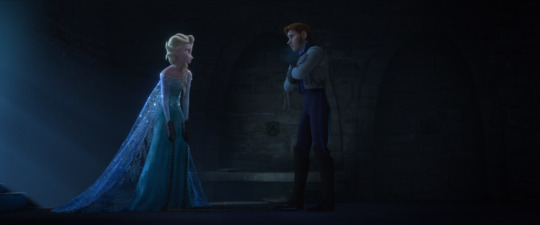
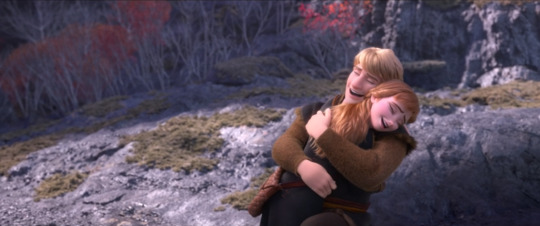

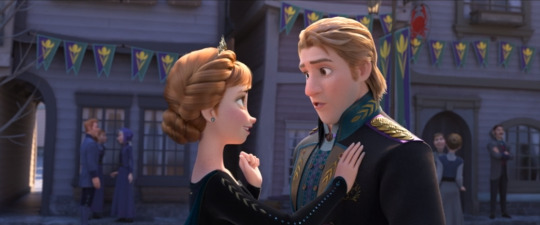
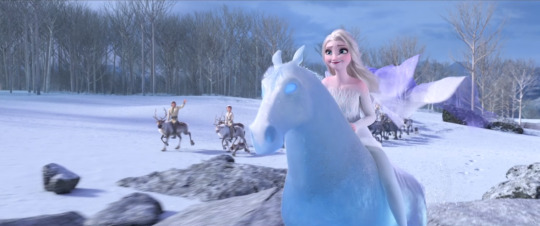
Totally personal, but the more I analyze it, the more I notice some sort of pattern around Frozen 2: the movie is very careful at showing in its opening WHAT idea Anna and Elsa had of themselves before the Accident (which, following Jennifer Lee prespective, happened that same night), and how that tragic event and the Separation distorted the Sisters view in opposite ways, which reconnects perfectly with the events of the first Frozen.
The insteresting thing is the focus given by Anna and Elsa on the characters of the story:
Anna says "Who cares about danger, when there is love.", and focuses on making the Prince and the Princess kiss each other in an exxagerated way;

Elsa instead says "They wake the Fairy Queen, who breaks the spell and saves everyone!", and her focus is on the good Fairy Queen defeating the evil Snow Goblin;

Both narrations obviously work in their own regards, but also compliment each other: even if for Elsa "kissing won't save the Forest", this doesn't stop Anna from closing the story with an "And they all get married!", and having her older sister laughing without contradicting her. This is clearly a way to show the Sisters simpler and happier times, when fantasy and games were their only issue.
But what makes me more curious is how Frozen 2 than brings Anna and Elsa both to a very specific ending: Queen Anna is engaged to Kristoff, but their "big moment" still needs to happen, while Elsa has just begun as the Fifth Spirit, without facing an actual threat yet, just destroying Prince Hans ice-memory.
Both Sisters have found their own place in the world, but there are also sides of their story which relate to them, but it's NOT ONLY about them:
If Anna thinks about Hans as a Villain, she also views Elsa as a Hero, her hero, as she has always done since the first movie, when she had so much hope in her "Sure you can. I know you can.";


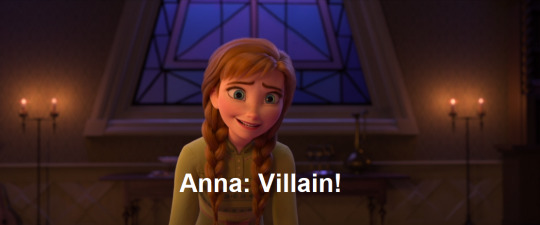

If Elsa views Kristoff as Anna true Love Interest, it's because he proved time and time again that he's a true Prince for her amazing and brave little sister , who she always trusted to be Arendelle true leader in her place "Your life awaits. Go enjoy the Sun and open up the gates.";
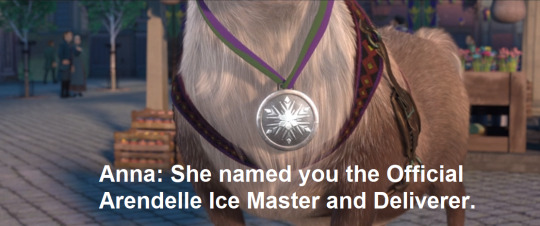

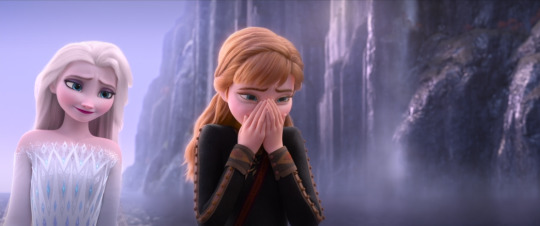

I'm sincerly convinced this new situation perfectly suits both Kristoff and Hans because we've seen Anna and Elsa already going through a lot of things about themselves.
I've always loved idea to see our Snow Sister being the one taking charge in relation and thinking about others issues, diving into Kristoff's childood, his original family and how he met Sven, and how the Trolls help him regarding his trauma, as well as finally getting a clearer idea of Hans , seeing a little more about him and Sitron, and seeing finally the Southern Isles, a kingdom we only know for having thirteen heirs to the throne:
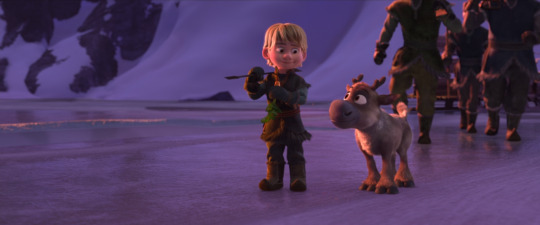

If Anna was the one that gave great importance to both of them in Frozen, now, thanks to Elsa in Frozen 2, we have now the key to truely know the past:

With the Sisters have both their lives consolidated, then I think it becomes quite clear they can't be the source of trouble to actually subvert the expectations of the story a third time, or, to be more specific: in order to involve Anna & Elsa directly and don't lose the focus on them, the issues must come from something that's fits their new status quo, but still has a deep and personal connection to them, both emotionally and narratively.

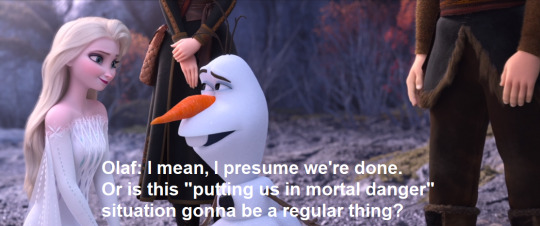

#Frozen#Frozen 2#Frozen 3#Anna#Elsa#Kristoff#Hans#Princess Anna#Queen Anna#Queen Elsa#Fifth Spirit Elsa#Prince Hans#Arendelle#Enchanted Forest#Southern Isles#Gale#Bruni#Nokk#Earth Giants#Olaf#Sven#Sitron#Trolls#Grand Pabbie#Lieutenant Mattias#Yelana#Honeymaren#Ryder Nattura#King Agnarr#Queen Iduna
76 notes
·
View notes
Text
MALMAISON MEDIA SALON SOIRÉE 17: THE PRINCESS OF NOWHERE (2010)

1. The Introduction
Hello, Dear Neighbors. Thank you for joining the party today. I’m feeling better, fortunately, and I’m ready to analyze media again.
Fittingly, today we’re talking about Pauline Bonaparte, the woman who had a scandalous reputation back in the day and seems like a typical party girl. Since I do like the woman, I’ve always been curious as to what kind of media is out there that tells her story.
Sure, there’s the movie called “Imperial Venus”, but it looks like Pauline is far more obscure than some of her family members (and don’t even get me started on Napoleon). So you can imagine how intrigued I was after stumbling across this particular book, written by a distant descendant of the Borghese family.
I’ll admit that the author’s identity did cause concern for me, mainly due to the potential for slander and negative bias to wriggle their way into the narrative, but the premise about the story being told from the prospective of a character close to Pauline seemed intriguing so I gave the book a shot.
Luckily, it’s available in free PDF form here. And, without spoilers, the read was… interesting.
This review is dedicated to @aminoscribbles .
2. The Summary
This is the story of Pauline Bonaparte and her tumultuous and toxic relationship with Prince Camillo Borghese, told from the point of view of Pauline’s foster daughter and distant cousin, Sophie Leclerc.
(Sophie is an original character btw. )
Sounds like an interesting idea with potential, but let’s keep going.
3. The Story
First of all, due to all the POV switching and the focus on Paulette, you can pretty much forget about Sophie since she fades into the background rather quickly and becomes irrelevant faster than a new fashion trend. Kinda makes me wonder why she was even in the book to begin with.
The plot pacing is also clunky, clumsily intertwined with flashbacks and fictional letters, but apparently the author is writing for the first time so of course it’s not going to be flawless. Still, I do wish he worked a bit more on the story before publication. 
The negative bias also is there but it’s a weird mixed bag and not as bad as I expected - there’s at least an attempt to make Pauline a complex character and tell the story of a toxic yet ultimately loving couple, so points for effort.
Unfortunately, the story speed runs through moments like Pauline joining Napoleon on Elba, moments that could’ve given us more of a glimpse into her character and would definitely be more engaging than the awfully long sex scenes in the book.
4. The Characters
As I said, Sophie becomes irrelevant fairly quickly so I’m not sure what to make of her. She’s a very flat character whose initial admiration for Pauline isn’t properly justified. Nor is her relationship with the woman properly explored. A shame and a waste of potential, really.
Pauline herself isn’t evil like I expected, so it’s a pleasant surprise. However, she’s still capricious, selfish and careless. She does have nice moments like personally nursing Sophie back to health and she does genuinely grieve her husband and later her son.
However, all the nice moments are undermined by the moment when it’s revealed that Pauline poisoned herself and Sophie with arsenic to make Borghese believe that they got sick and send them to France. Err… WTF?!
(Yes, she does that in the book, even though the real Pauline was so sickly that she wouldn’t even NEED poison. As for poisoning a child… can’t imagine her doing so.)
Borghese himself is, naturally, almost a saint (duh), but still makes mistakes here and there, so he’s just flat and we never see a deeper dive into his relationship with Pauline.
To be honest, all characters are flat and underdeveloped so let’s move on.
5. The Setting
Some descriptions are good but, again, underdeveloped.
6. The Writing
The writing style is actually solid and sometimes engaging, but there are a few instances of Pauline being a bit too crass to feel realistic and those sex scenes are boring as hell.
Couple that with flashbacks and letters and yeah… it’s a hit or miss at best.
7. The Conclusion
All in all, definitely not an awful book. I’ve seen MUCH worse. That being said, it’s not a good book either. Just… decent but underbaked.
Check it out if you want, but it’s still biased towards Borghese and doesn’t do Pauline justice, unfortunately. It’s a mixed bag for me though so I will not reread this book.
Anyway, on that note, let us end our tiny soirée. Stay tuned for more reviews, everyone!
Love,
Citizen Green Pixel
#malmaison media salon#pauline bonaparte#napoléon bonaparte#camillo borghese#general leclerc#napoleonic media#obscure napoleonic media#napoleonic books
33 notes
·
View notes